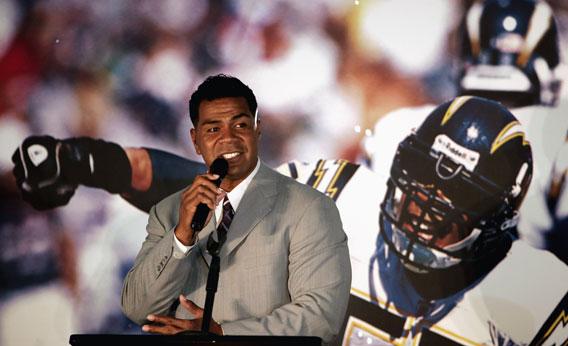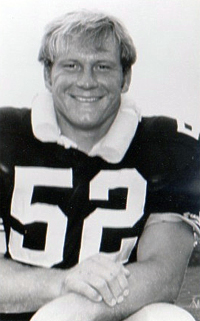On April 19 of this year, former Atlanta Falcons safety Ray
Easterling committed suicide by gunshot. Easterling had suffered from dementia
for years and had a host of physical problems. He was vocal about the danger of
concussions and was one of the main plaintiff’s of one of the many current
lawsuits pending against the NFL for covering up knowledge of the potential
damage of repeated head trauma.
Easterling was 62 years old.
*****
There had been no details released except for the bare,
tragic, minimum:
Two things happened as soon as that information got out:
first, a massive outpouring of grief and remembrances for a man that was universally
thought of as one of the “good guys” of the sport. A man with his own
charities, a man closely tied with his community, a great player who by all
accounts was a great man off of it. If anyone had an ill word to say about
Seau, nobody heard it.
Then people everywhere started connecting this tragedy to
the NFL and its current head trauma crisis, myself included.
Now, at this point, there is no evidence whatsoever that
Seau suffered from Chronic Traumatic Encephalopathy (CTE). There had been no
public reports of him suffering from dementia or any other neurological
condition. All that was known was a 43 year-old man had committed suicide.
However, simply because his profession was “former professional football
player” masses of people immediately leapt to the conclusion that this was
another concussion related tragedy. Now, whenever a former NFL player dies, the
most likely cause of death in the court of public opinion is trauma from
repeated head injuries. If the NFL doesn’t get a handle on this issue and finds
ways to keep the athletes safe, fans will start to walk away, unable to
rationalize enjoying the violent spectacle of a football game, knowing all too
well what lies in store for so many of these men in the not too distant future.
And, sooner rather than later, I will be one of them.
*****
On February 17, 2011, Dave Duerson, former safety for the
Chicago Bears, fatally shot himself in the chest in his home in Florida. He shot himself in the chest because he
wanted his brain to be studied by the University of Boston, the leading
researchers into CTE. In May of 2011,
it was confirmed that Duerson’s brain had suffered from CTE. He was 50 years
old.
*****
Football was my first love.
At 3 years old, my Christmas present from Santa Claus, that I asked for
in detail, was a set of action figures consisting of at least a dozen players
from the Cincinnati Bengals and San Francisco 49ers, the participants in Super
Bowl XXIII. I asked for every player specifically by number, and every 49er
player I asked for I knew by name. I was trotted out as a show pony by my
parents to show off my ability to rattle off every offensive starter for the
1989 San Francisco 49ers, including the offensive lineman (Just for kicks, I
tried to see if I still could do the o-line off memory. Nailed Bubba Parris,
Guy McIntyre, Jesse Sapolu, and Harris Barton. RG Bruce Collie slipped my
mind.) Since I could speak in full sentences, I’ve been a 49er die-hard.
I never played football, cutting a deal with my parents that
I would wait until high school to play, only to suffer a brain injury in 8th
grade, which precluded me from playing.
Missing out on playing football has always been a melancholy what-if for
me. Now, I’m not so sure it wasn’t all for the best.
*****
Andre Waters was a safety for the Philadelphia Eagles from
1984-1993. Waters died of a self-inflicted gunshot wound to the head on
November 20, 2006. His brain tissue was sent to the University of Pittsburgh to
be studied for potential CTE diagnosis by Dr. Bennett Omalu. Dr. Omalu found that Waters’ brain tissue
had deteriorated to that of an 85-year old man with early stage Alzheimer’s.
Waters was 44-years old when he died.
*****
While my football career never got off the ground, my
younger brother had a fairly successful interscholastic career. He was the starting Left Tackle on Varsity,
and only gave up one sack in his senior season. He was undersized, but was
quick and had good technique, and was tough as nails, wrapping a mangled right
hand in a knee pad and about 2 rolls of athletic tape, turning it into a
“flipper” as he called it.
Even though he never touched the ball, I loved watching my
brother play, just like I’ve loved watching every sport he’s ever played. Seeing him come flying around on a trap and
blowing up a d-lineman and creating a gaping whole was way more fun than it
should have been. Multiple coaches told me that if he had the desire to, he
could play Center at lower division college because of his solid technique and
great brain for the game. My brother never had that level of love for football,
but I always wished I would have had the chance to see my baby bro play college
ball.
Now? I’m just glad he made it out with (hopefully) limited
wear and tear, playing only 1 season of Varsity, praying that there will be no
lingering effects down the road.
*****
“Iron” Mike Webster was the Center for all four of the
Pittsburgh Steelers Super Bowl championship teams. He was inducted to the Pro-Football Hall of Fame. Many consider
him the greatest Center in the League’s history. After retiring from football, Webster suffered from amnesia,
dementia, depression, and acute bone and muscle pain. Webster was proven to be
legally disabled before he retired from the NFL. He lived out of his pick up truck or train stations for the last
few years of his life. He died in 2002 at the age of 50 and after his death was
the first person to be diagnosed with CTE.
*****
I’ve had a bit of an un-easy relationship with football for
about two-and-a-half years now. In
October of 2009, I picked up GQ magazine to read while on my lunch break and
help pass the time. In it was an article titled “Game Brain” about concussions
in football. To this day its one of the
best pieces of investigative journalism I’ve ever read, and simultaneously one
of the most horrifying and emotionally draining things I’ve read in my life. If
you are even a casual football fan, you have to read it, if nothing else to
have a firm grasp on the severity of the issue.
After reading that article I felt incredibly
conflicted. I loved football, but how
could I enjoy a sport knowing what happens to so many players once they retire?
I felt dirty and thought about giving up the sport I ever loved. Over time, the feelings of that article
faded. The NFL reversed its previous
stance and started making progress in at least attempting to keep players
safe. My fears were assuaged, and I
resumed my place as insane 49er fan. But that nagging, uncomfortable feeling
never went away for me.
*****
Chris Henry was a Wide Receiver with the Cincinnati Bengals
from 2005-2009. Henry only played in 55 games in 5 professional seasons. He had
119 career receptions. On December 16,
2009, Henry passed away after falling out of the back of a moving pick-up truck
following a domestic dispute with his fiancé.
Henry died of blunt force trauma to the head. In June of 2010, the Brain
Injury Research Institute of West Virginia announced that Henry had developed a
case of CTE. He was 26- years old.
*****
I can say with a reasonable amount of certainty that if the
NFL season started tomorrow, I would have absolutely no interest in following
it. While the Junior Seau case may very well have nothing to do with any of the
other tragedies, it still brings up the question of “what-if” and brings the
thoughts and emotions connected with the other cases of CTE back to the
forefront. I feel a certain level of disgust with myself for my fandom, and
that is a feeling I absolutely do not like.
Speaking realistically, I doubt that this is the incident
that puts me off of football for good. The season is still over four months
away, and like after the GQ article in 2009, the passing time will cause all
these emotions to fade into the background, and I will go back to anxiously
awaiting the start of the season and a hopeful deep playoff run for my 49ers.
But there’s no telling if the next death will be the one
that does it. Whether it’s a somewhat
obscure player or one of my childhood heroes, I could see another tragedy of
this magnitude being the straw that breaks the camels back. At some point in the relatively near future,
the consequences will be too much, and I’ll have to give up football and focus
my time on other pursuits.
The question the NFL should be nervously asking, is how many fans might be turning away with me?






1 comment:
Excellent article. Interspersing personal memories with the suspicious deaths of the players makes a compelling story.
Post a Comment